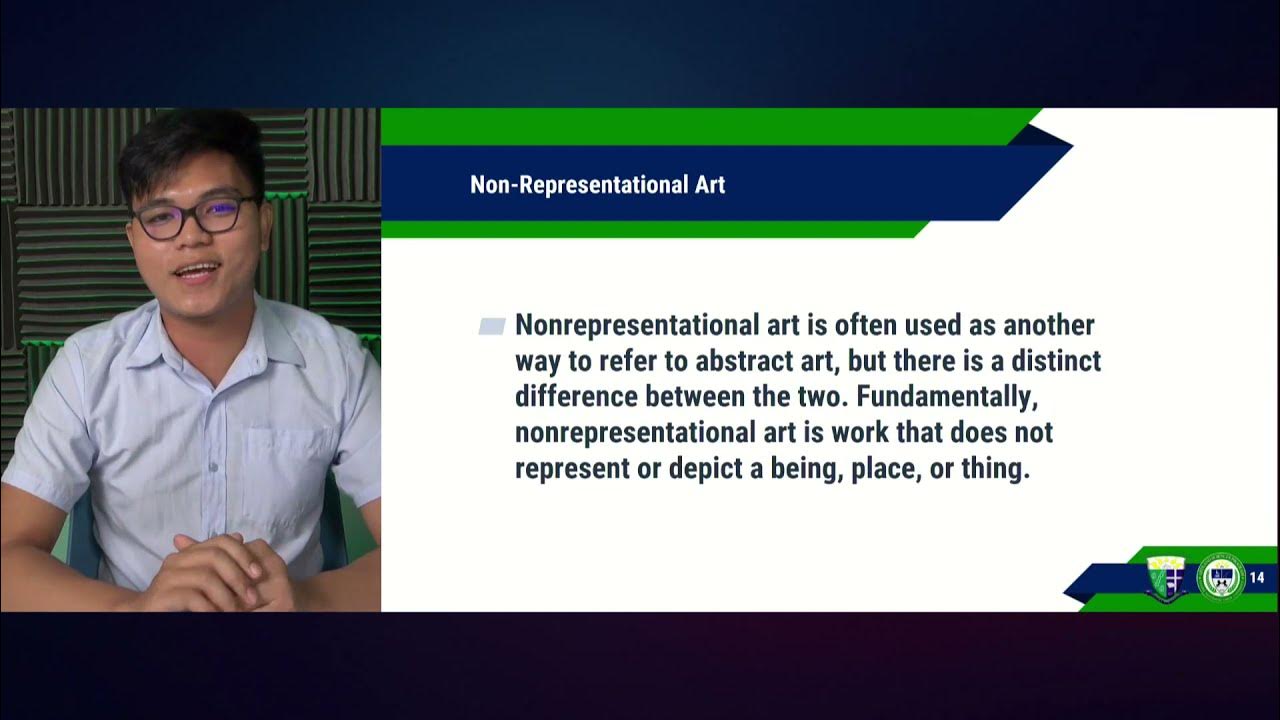Art Styles: Methods in Presenting the Subject
Summary
TLDRThis video script delves into the diverse styles of art, distinguishing between representational and non-representational art. It outlines various artistic methods, including naturalism, abstractionism, surrealism, symbolism, expressionism, and impressionism. Each method is briefly explained, highlighting how artists interpret and present subject matter, from realistic depictions to emotional and subconscious expressions, offering viewers an insightful look into the world of art.
Takeaways
- 🎨 Style in art refers to the way artists use materials and techniques to portray subject matter.
- 🔍 Art styles are categorized into representational (objective) and non-representational (non-objective).
- 🌐 Representational art depicts subjects that are easily recognizable, drawing from people and nature.
- 🌈 Non-representational art, or abstract art, consists of lines, colors, textures, and shapes without forming recognizable figures.
- 🌳 Naturalism or realism is an art method that presents subjects as they appear in real life, following Plato's concept of 'mimesis'.
- 🚫 Abstractionism moves away from realism, creating art that is a departure from what is present in real life.
- 🌌 Surrealism presents the subconscious reality, blurring the lines between dreams, fantasy, and objective reality.
- 🔮 Symbolism uses subjects as symbols to represent something beyond their literal appearance.
- 😣 Expressionism focuses on expressing emotions such as chaos, fear, and tragedy, often using colors and forms to evoke feelings.
- 🌅 Impressionism emphasizes the artist's perception and the effect of light on the subject, capturing the 'impression' rather than a detailed representation.
Q & A
What is the difference between representational and non-representational art styles?
-Representational art styles depict subjects that are easily recognizable and taken from the world of people and nature, while non-representational art styles do not resemble any real subject and are composed primarily of lines, colors, textures, and shapes without forming recognizable figures.
What does it mean for a style to be objective or non-objective?
-An objective art style, also known as representational, aims to depict subjects as they appear in real life. A non-objective style, or non-representational, does not aim to represent reality but instead focuses on the artist's interpretation and abstraction.
How is naturalism or realism different from abstractionism?
-Naturalism or realism presents subjects as they appear in real life, adhering to Plato's concept of 'mimesis' or copying nature. Abstractionism, on the other hand, moves away from realism and does not represent the real world in a literal sense.
What is surrealism in the context of art styles?
-Surrealism goes beyond realism and is concerned with presenting the subconscious reality of the artist. It projects subjects as if they belong to the world of dreams and fantasy, rather than the objective reality.
Can you explain the symbolism art style mentioned in the script?
-Symbolism in art presents subjects in a way that they appear in real life but with the intention of representing something beyond their literal appearance. It uses visual symbols to convey deeper meanings or concepts.
What is expressionism and how does it differ from naturalism?
-Expressionism is an art style that presents real-life subjects with the intention of expressing emotions such as chaos, fear, violence, and tragedy. Unlike naturalism, which focuses on accurately depicting reality, expressionists use colors and forms to convey their feelings and emotional states.
How does impressionism differ from other styles of presenting subjects?
-Impressionism emphasizes the impression or perception of the artist, particularly the effect of light on the subject. It does not aim for a detailed, realistic representation but rather captures the fleeting moment and the artist's sensory experience.
What role does the artist's perception play in impressionism?
-In impressionism, the artist's perception is central, as the style seeks to capture the immediate impression of a scene, including the interplay of light and color as it appears to the artist at a specific moment.
How does the use of color differ between expressionism and impressionism?
-In expressionism, colors are used to express emotions and may not necessarily reflect the natural colors of the subject. In contrast, impressionism uses color to convey the changing effects of light and to create a sense of atmosphere and mood.
What is the significance of the term 'abstract' in the context of art?
-The term 'abstract' in art refers to a departure from realistic representation. Abstract art does not aim to depict real-world subjects but instead focuses on the use of colors, shapes, and textures to create a visual language that communicates feelings or concepts.
How does the script suggest that an artist might approach their work in surrealism?
-The script suggests that in surrealism, an artist might approach their work by exploring the subconscious mind and presenting subjects in a way that blends reality with the world of dreams and fantasy, creating a sense of the surreal.
Outlines

This section is available to paid users only. Please upgrade to access this part.
Upgrade NowMindmap

This section is available to paid users only. Please upgrade to access this part.
Upgrade NowKeywords

This section is available to paid users only. Please upgrade to access this part.
Upgrade NowHighlights

This section is available to paid users only. Please upgrade to access this part.
Upgrade NowTranscripts

This section is available to paid users only. Please upgrade to access this part.
Upgrade Now5.0 / 5 (0 votes)





